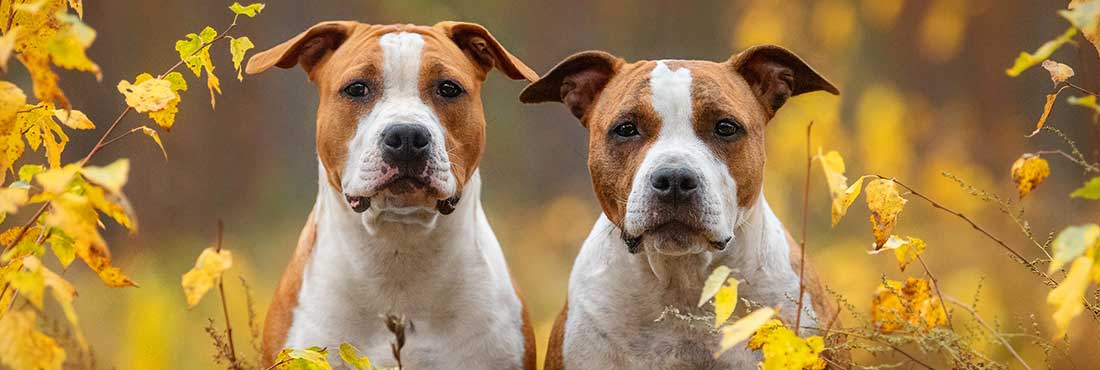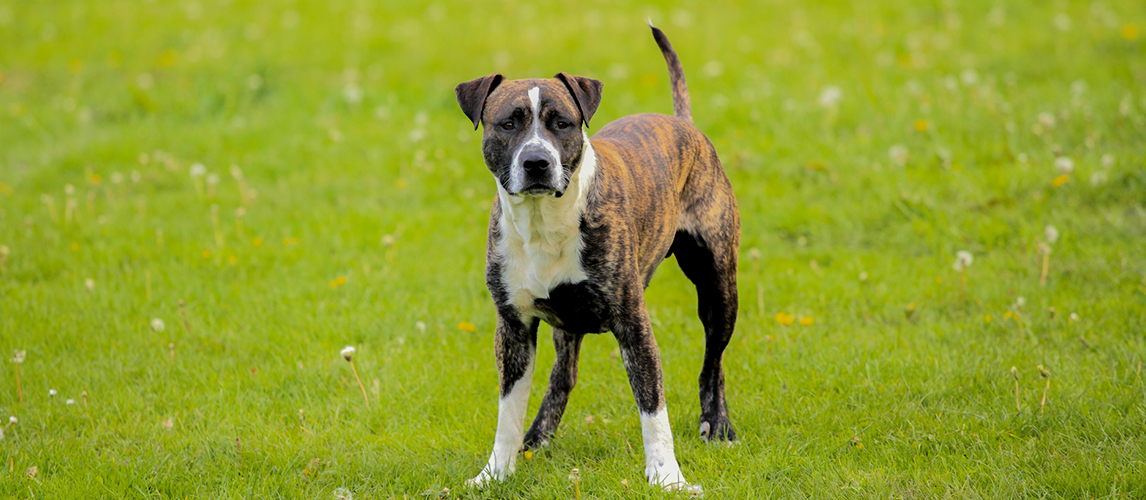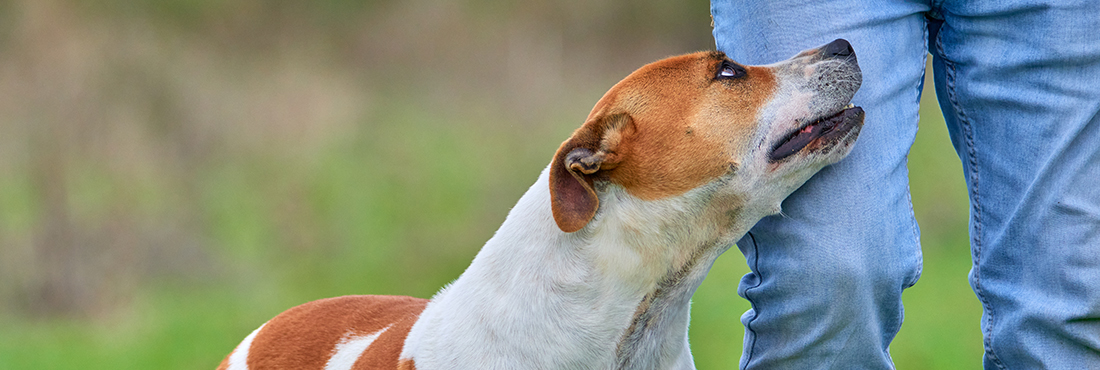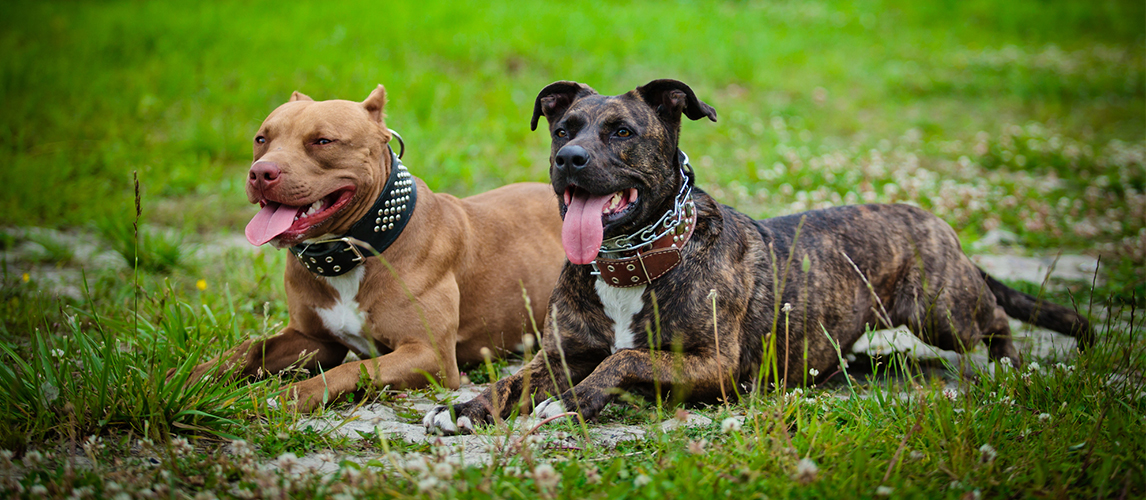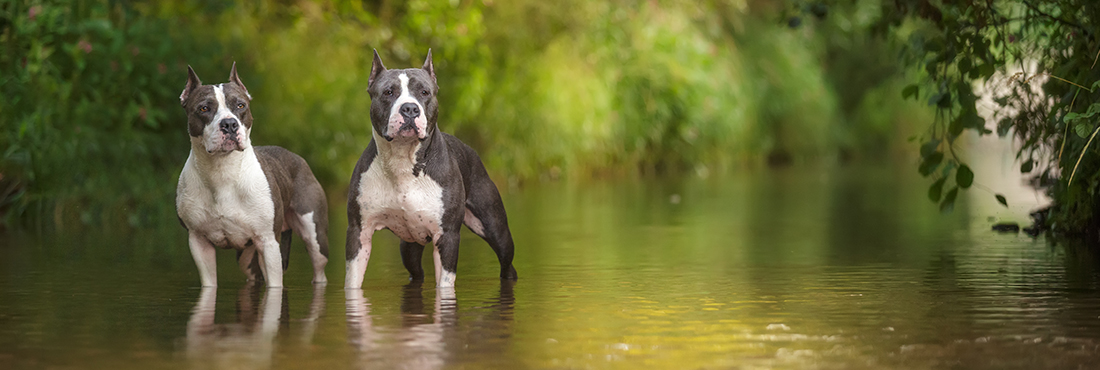Understanding a dog’s lifespan is part of getting and owning a canine. Since Pit Bulls are growing in popularity, you may be looking to learn more about how long a particular type of Pit Bull lives. However, comprehending the exact life expectancy of a breed is difficult, and there are a lot of things that factor into a dog’s longevity. Read on to learn more about each dog breed and what you can do to give your Pit Bull the best life possible.
The Different Types of Pitbulls
First of all, you may be surprised to learn that there are specific breeds of Pitbull. In fact, ‘Pitbull’ is merely a blanket term used to refer to these individual breeds and perhaps mixes that mostly resemble their Pitbull parent. These dog breeds include the American Pit Bull Terrier, the Staffordshire Bull Terrier, the American Bully, and the American Staffordshire Terrier.
To narrow down the question of ‘how long do Pit Bulls live’, we have listed the dog breeds that fall under the category along with their average lifespan. If you’ve already been conducting some reason, you may notice that each lifespan conflicts depending on where you look.
It’s important to note that the ages below are an estimation based on the average lifespan. This is because there are many factors to take into account, such as health conditions, care, and genetics that contribute to a Pitbull’s life expectancy. You can find more on this topic below.
Pitbull Average Lifespan According to Breed
| Pitbull Type | Lifespan |
|---|---|
| American Pit Bull Terrier | 8 - 15 years |
| American Staffordshire Terrier | 12 - 16 years |
| Staffordshire Bull Terrier | 12 - 16 years |
| American Bully | 8 - 13 years |
When taking in the above information, remember that although American Staffordshire Terriers supposedly live longer than American Bullys, the average Pitbull lifespan can be heavily influenced by their quality of life. The same can be said about Staffordshire Bull Terriers compared to American Pit Bulls.
Additional Note: If you’re looking specifically for the life expectancy of the Red Nose or Blue Nose Pitbull, these dogs are considered a variety of the American Pitbull Terrier and will therefore have the same lifespan.
Average Lifespan of a Pitbull Mix
Generally, Pitbull mixes live around the same amount of years as their parents, but this can completely depend on what breeds they derive from. Additionally, like every other dog breed, their lifespan will also be heavily impacted by genetic and environmental factors.
Common Pitbull Mixes:
- Pitbull Mastiff
- Pit Pei (Shar-Pei and Pitbull mix)
- Pitsky (Husky and Pitbull mix)
- Golden Pit (Golden Retriever Pitbull)
- Beagle Pit
- Pitador (Labrador and Pitbull mix)
Factors That Impact The Pitbull Life Expectancy
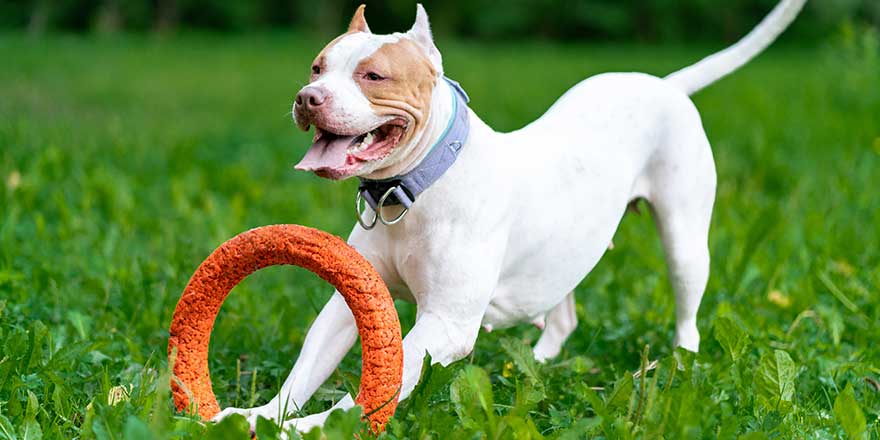
Although most Pitbulls live up to 16 years, there are factors that all dog owners should be aware of that can greatly impact their life expectancy. Fortunately, some of these aspects can be managed, but there are others that you won’t have as much control over.
Spaying/Neutering
If you’re not considering breeding a Pitbull, it’s highly recommended that you spay or neuter them when they reach the appropriate age. Dogs not spayed or neutered are more at risk of developing tumors and reproductive system-related illnesses.
Exercise
Pitbulls are active dogs that require daily exercise to keep fit and fend off obesity. These dogs are typically muscular in build, too, so their muscle mass needs adequate activity to stay strong.
Diet
All Pitbull breeds will require high-quality Pitbull dog food to live a healthy life. A great diet will not only boost and maintain their immune systems but also look after their eyes, heart, joints, coats, and skin. In addition, pit Bull owners are recommended to cater the diet to their dog’s age to be appropriately cared for.
General Care
It’s not uncommon for Pit bulls to become stressed, which can lead to further health issues later in life. In particular, Pit bulls can develop separation anxiety, so it’s important to ensure that your canine companion receives the care and attention they need.
Furthermore, although these dogs take great care of themselves, they will need a little extra attention to care for their skin and coat. Regular grooming and bathing are necessary for Pitbulls as their skin can be very sensitive.
These breeds can also develop allergies that can take their toll on your dog’s skin, leaving them sore and sensitive. When this occurs, pet owners must seek the advice of a veterinarian so that they can find the cause and tend to the symptoms as effectively as possible.
Living Arrangements
Since Pitbulls are known to develop stress and anxiety, they must have access to dog toys, accessories, and resources at home. Things such as comfortable bedding, toys, and space to run around outside that provide basic comfort make a big impact on a Pitbull’s quality of life.
Genetics and Health Problems
Despite being strong, healthy dogs, Pitbulls can fall ill with several troubling illnesses. However, it’s important to remember that not all Pitbulls will develop these issues but are more likely to develop them due to genetic predisposition. For example, American Pit Bull Terriers, in particular, are prone to developing hypothyroidism, affecting their coats and weight.
As mentioned previously, Pit Bulls can also develop skin conditions and allergies, which can impact their overall health if not managed properly.
Health Concerns that Can Impact the Pitbull Lifespan
Following on from the previous segment, you can find the most common health problems affecting Pit Bulls below. But fret not. Although these issues are troubling, there are things you can do as Pitbull owners to ensure your dog lives a long and healthy life. Fortunately, you can find more information about this further along in this article.
Obesity
Many breeds, especially the average Pitbull, are at risk of weight gain as they age. This can put a lot of pressure on their organs and joints if it isn’t managed properly.
Heart Issues
Sadly, when weight has not been managed, the risk of heart disease in Pitbulls increases. Heart disease, specifically aortic stenosis, may also be genetic, so it’s crucial to take your dog for regular vet checkups.
Hip Dysplasia
This condition is another that is passed down through the generations. Hip dysplasia is where the hip joints develop abnormally, causing much pain and discomfort. Eventually, this condition will lead to your dog developing arthritis.
Cancer
Unfortunately, Pit Bulls can develop cancer. This can occur due to genetics and even environmental factors.
Skin Diseases
Since Pitbulls are known to have sensitive skin, they can sometimes react badly to external irritants and poor nutrition and care. Often, Pit Bulls can develop allergies that will also lead to skin issues.
What do Most Pitbulls Die From?
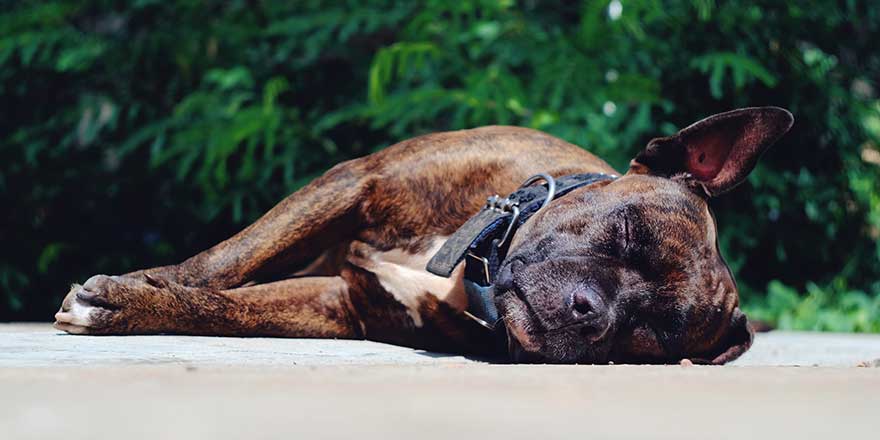
When reading through articles revolving around the Pit Bull life expectancy, it’s important to remember that these breeds are considered to be healthy in general. However, as upsetting as it is, no dog is invincible. Below are the common reasons why some Pitbulls live shorter lives.
Health Conditions
Cancer and skin issues are the two biggest causes of death when your Pitbull’s health is concerned. Typically, cancer is more likely to occur in a senior dog, so you are more likely to spot it early if you take them to regular vet checkups.
Skin diseases are not likely to lead to death if treated appropriately but it’s crucial to understand that they can invite extremely harmful bacterial infections if left alone.
Euthanasia
It’s deeply concerning and upsetting to think of any animal being euthanized. Sadly, the Pitbull is the most common dog breed to be euthanized and to top it off, these breeds (including Pitbull mixes) are known to be one of the most mistreated. This is because of the stigma and misinformation that still circulates, resulting in an ongoing bad reputation for these dog breeds.
Poor Treatment
It’s no secret that these dog breeds are popular amongst those with bad reputations. Unfortunately, in some instances, many Pit Bulls may not be given the best care they need and, as a result, fall victim to aggression, illness, and even stress/trauma.
Furthermore, Pitbulls that aren’t given the best upbringing and training can also struggle with behavioral issues and, as a result, engage in dangerous dog fights. Sadly, the result of these can claim a dog’s life.
Tips to Help Your Pitbull Live Longer
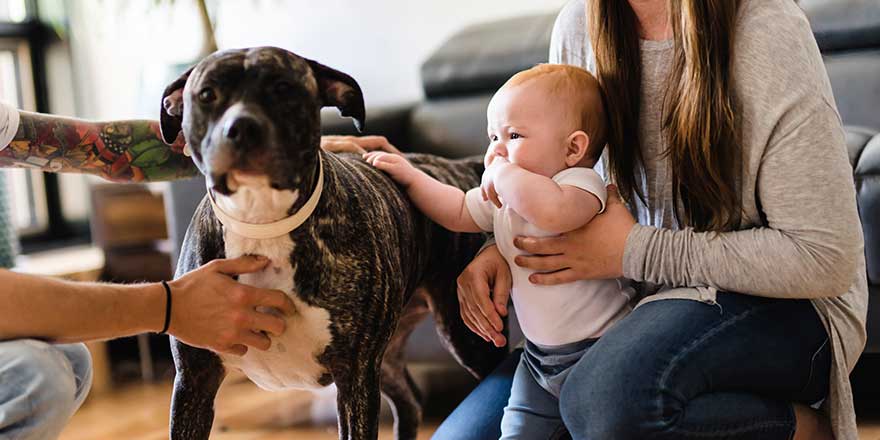
So after reading through some of the factors that can heavily impact a Pitbull’s lifespan, you may be wondering if there are steps you can take to improve their quality of life significantly. The good news is that you can do plenty of things to take good care of your canine companion!
Regular Exercise
Regular exercise can not only help to maintain a healthy weight but can also fend off boredom. In addition, getting your Pit Bull outside can help socialize them and burn off excess energy that can lead to destructive habits.
However, if you’re concerned about external factors such as car accidents or diseases that can potentially harm your dog, think about modifying your garden. You can even purchase items that will mean your dog can reap the benefits of playing outdoors without you having to worry about their safety.
Top Tip: It is recommended that a Pit Bull is exercised for at least one hour every day.
Give Them a High-Quality Healthy Diet
Giving your dog the best diet from a very young age will significantly impact their well-being and quality of life. Not only will it reduce excessive weight gain, but it will also take care of them inside and out.
High-quality dog food will take care of their development (especially where joints are concerned), brain function, eyesight, coat, and skin care, down to their gut health. Of course, homemade dog food can be a great option, but it’s important to ensure they get every nutrient they need to be happy and healthy.
If you’re unsure what the best diet is for your pup, you can always talk to your vet or enlist the specialist help of a dog nutritionist.
Give Them Vitamins
Multivitamins aren’t always necessary when your dog gets everything they need from their diet. However, supplements can offer additional things such as dog probiotics, vitamins, and minerals that can influence the Pit Bull’s lifespan.
Talk to your vet beforehand if you’re unsure whether you should introduce supplements to your dog’s diet.
Provide Adequate Living Conditions and Resources
Whether indoor dogs or outdoor dogs, ensuring they have everything they need is key to their well-being. So, in addition to getting them toys and comfy doggie beds, you must invest in socialization and obedience training to reduce the chances of bad behavior or destructive tendencies.
Furthermore, you must ensure they are well-groomed by bathing and brushing them regularly. Looking after your dog’s teeth is also paramount as they can sometimes develop dental diseases affecting their eating habits.
Understand and Adapt When Their Needs Change
Pit Bulls’ needs will change depending on their age. For example, as they begin to grow old, Pit Bulls will require different nutrition to prevent weight loss and look after their joints. An older Pit Bull may need a more suitable and comfortable bed to rest their legs and joints better.
Similarly, Pitbull puppies will require a specific diet to ensure that they develop at a rate that won’t harm their joints. It’s advised that you change their diet when they reach a certain age, so talk to your vet when looking into changing your pup’s diet.
Regular Vet Checkups
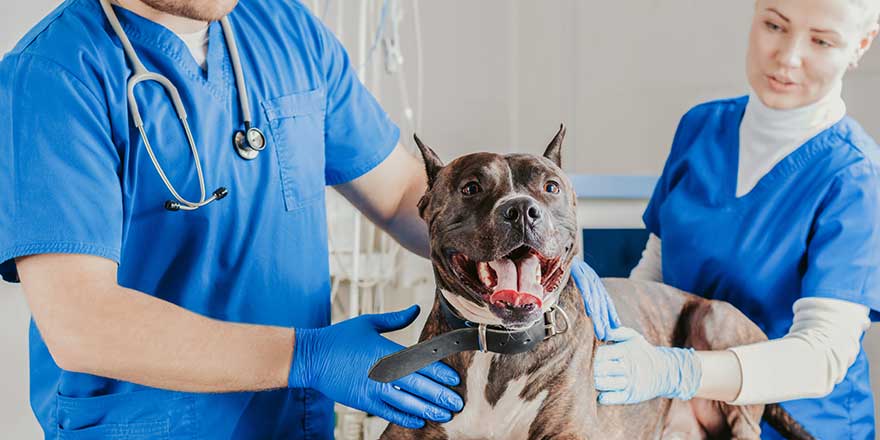
Taking your Pit Bull to the vet regularly is a must. By doing so, you can be sure that they stay in the best shape possible. Moreover, if they are in danger of developing a serious health issue, they are more likely to catch and treat it early with the help of proper health care.
Shower Them in Love
A happy Pit Bull is a healthy Pit Bull! Dogs love to be showered in their parents’ love and affection.
Additionally – Source Your Pit Bull from a Reliable Breeder
Always do your research. Reliable breeders will always, without a doubt, ensure that their parent dogs are healthy and will screen pups for common Pit Bull diseases. They will also provide proof of healthcare screenings and will provide answers to any question you have to ask about your Pitbull puppy.
To Conclude: How Long do Pitbulls Live?
Taking care of a Pit Bull can be challenging but rewarding as you will be gifted with a best friend for life. On average, Pit Bulls live between 8 – 16 years, but it’s worth remembering that you can make the most out of it by providing them with the best possible care. In fact, did you know that the oldest Pit Bull lived to be 26 years old?!

